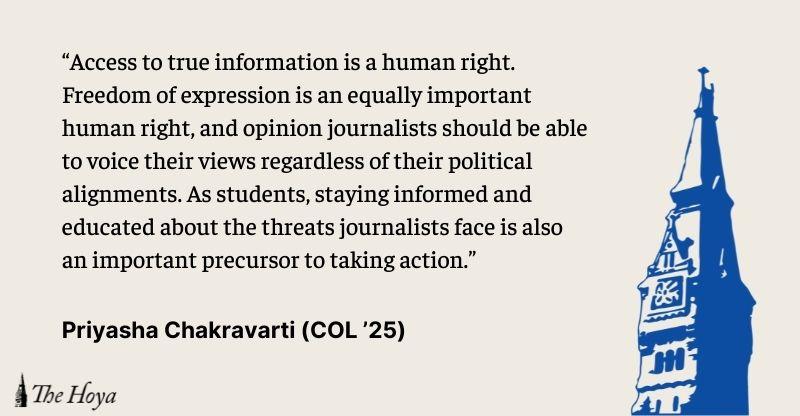Journalists are tasked with an uphill pursuit: sifting through a mountain of research in order to explain significant information to the world and preserve the truth.
Freedom of the press is a central tenet of democracy, but it is actively being threatened in various countries around the world. Despite this, journalists — whether they be students working in a college newsroom or professionals working at a top publication — must continue to resist unjust opposition and stand up for their rights.
Maria Ressa in the Philippines is a journalist who does just that. The Philippines was ranked as the seventh most dangerous country for journalists in 2020, with more than 20 journalists being killed under the current regime. A longtime target of incumbent President Rodrigo Duterte is the Rappler online news agency. Founded by Ressa, the publication has been openly critical of the Duterte administration.
Rappler has been especially open about reporting the consequences of Duterte’s war on drugs, noting that the number of extrajudicial killings under his administration rose more than 50% during the COVID-19 lockdown. This includes persecuting those without any clear link to drug usage and without pursuing the due course of law. According to the Philippine Drug Enforcement Agency, between July 2016 and September 2021, approximately 311,686 people were arrested and 6,201 killed under this regime.
Criticizing the news outlet as a source of “fake news,” Duterte had Rappler’s license revoked. His government has openly criticized and arrested Ressa several times. As the first Filipino Nobel Laureate and a Time Magazine Person of the Year in 2018, Ressa has been outspoken about her disapproval of “how far the government will go to silence journalists.”
Rappler is not the only news platform that has come under fire during Duterte’s regime. In the summer of 2020, the National Telecommunications Commission issued an order against ABS-CBN, the country’s largest broadcast network, prompting the regime to shut the network down. 70 million Filipinos watch ABS-CBN programs weekly and there was tremendous backlash. After numerous hearings with most committee members being supporters of Duterte’s regime, the majority voted against renewing its franchise, forcing it to go off air.
Shockingly, the press in the Philippines is still mistakenly seen as one of the freest in Asia. Perhaps Ressa’s relentless fight against the oppression of human rights in the Philippines and her tremendous achievements can be seen as signs of victory against Duterte’s regime. In fact, the Norwegian Nobel Committee characterized Ressa as “a fearless defender of freedom of expression,” who continues to stand up for what she believes in, despite numerous arrests and death threats. Unfortunately, however, Duterte continues to refer to journalists like Ressa as “spies,” “vultures” and “lowlifes.” Outwardly targeting media companies and news platforms that are critical of the administration and forcing them to shut down is a blatant attack on freedom of speech and expression. Achieving true press freedom in the country is a fight that is far from over.
Access to true information is a human right. Freedom of expression is an equally important human right, and opinion journalists should be able to voice their views regardless of their political alignments. As students, staying informed and educated about the threats journalists face is also an important precursor to taking action. Here at Georgetown, we must advocate for the dissemination of truthful knowledge, while also ensuring that different perspectives are represented and that our right to freedom of speech is upheld. Like Ressa, we must continue to make our voices heard, whether it be through news publications, comedy shows, or theater performances, and fight against any blatant attempts to silence the student body.
Priyasha Chakravarti is a first year in the College. Chakravarti currently serves as a news writer for The Hoya and has recused herself from writing news stories about the topics discussed in this Viewpoint.









